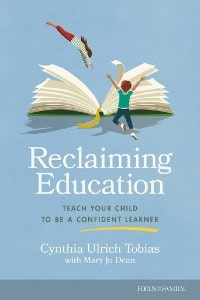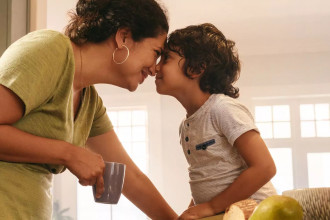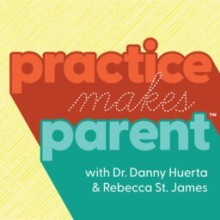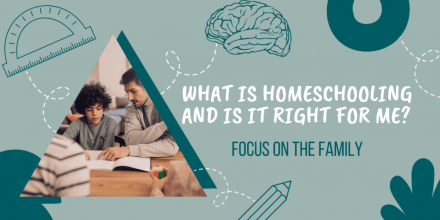Cynthia Tobias: Give yourself a lot of credit as a parent. You’re teaching them to use a spoon, how to read, how to eat.
Jim Daly: (laughs) That was the easy part.
Cynthia: You’re a good teacher. And, and um, it doesn’t mean that you have to homeschool them. There are many ways to do it other than that, and we’re finding some incredible ways to help educate our children without necessarily putting them in a classroom the same way every day. But the credit … a lot of the credit goes to parents. Have confidence in yourself first. You can do this. You can help your child learn because it’s a partnership.
John Fuller: Well, that’s Cynthia Tobias describing the essential role that parents play in your child’s education, and Cynthia will share more of her insights and expertise today on Focus on the Family. Thanks for joining us. Your host is Focus president and author Jim Daly, and I’m John Fuller.
Jim: John, I’ve always believed that a child’s first teachers are mom and dad. That makes perfect sense because we’re there, and we’re most responsible for who they are and who they’re gonna become. And for us as Christian parents who want to guide them, obviously, toward a relationship with Jesus Christ and to, you know, develop their character, their heart in such a way that they can see the world through that, I’m not ashamed of that. Sometimes, people outside of the Christian faith, they kind of belittle us for doing that, but that i- (laughs), that’s our prerogative as parents with our children.
John: Mm-hmm.
Jim: There has been this brewing contention that’s occurring now with public education, and we have a wonderful guest to talk today with us about what’s happening, how we as parents should be looking at this situation. And, you know, for me, this is really important. If I were back at square one with Trent and Troy, I would seriously be looking at alternatives to public schools. Our boys did go through charter school. It was a good experience, but the charter school was really, you know, encouraging of parental involvement. A lot of public schools are not. And, uh, I- we really have the- the goal today to equip you to make the best decision that you can make. And let me say for those listeners and viewers who are Christians working in public schools as teachers or school administrators, we get that it’s a mission field, and we are, you know, blessed to know that you’re there and encouraging those kids, and we will pray for you as we often do here at Focus on the Family.
John: Yeah, the atmosphere isn’t- is not exactly conducive to, um, shaping character from a Christian perspective for those teachers, so we are grateful. And, uh, the key you mentioned there, Jim, is it’s our responsibility as moms and dads.
Jim: Yeah.
John: And today, our guest, uh, is a, uh, an educational consultant and guru, uh, Cynthia Tobias. Uh, she is back here at Focus, and she’s a popular author and speaker. She’s got a passion for education and learning and helping families be successful. Uh, her most recent book is published by Focus on the Family, and the title is Reclaiming Education: Teach Your Child to be a Confident Learner. And you can learn more about that and our guest at the website focusonthefamily.com/broadcast.
Jim: Cynthia, welcome back to Focus. Always good to have you here.
Cynthia: Oh, thanks, I really enjoy it.
Jim: You’re such an interesting mix of background as a police officer and schoolteacher (laughs). You’re just-
Cynthia: Actually, there’s more in common than-
Jim: I was going to say, did you find much distinction-
John: (laughs)
Jim: … between the two?
Cynthia: (laughs) It has its moments.
Jim: Yeah. And in that context, what we were saying a moment ago is so true. Right? There are wonderful-
Cynthia: Absolutely.
Jim: … Christian people working in public education, and boy, do we need them there. And we need even more people there.
Cynthia: And all of my eight years of teaching was in public education.
Jim: Yeah.
Cynthia: But it was an uphill battle in many times.
Jim: And I think the key point there is there seems to be so much transitioning from the lockdown with the pandemic and, and I think parents really getting a deeper view into public education, what’s going on. And every district is different. We are generalizing in this broadcast about this. And I get it, but we want parents’ eyes wide open. Speak to the revelation that seems to have occurred, uh, coming out of the pandemic. What happened, and why are parents all of a sudden alarmed?
Cynthia: Well, 2020 was a huge wake-up call because the classroom became the living room. And suddenly, parents realized what the kids were and weren’t learning, and it was, it- it was obvious. W- well, there w- you know, we believed that th- public schools, all the schools were obviously student-focused, and they cared about what kids learned and how they learned it, but we found out actually, they don’t. It really isn’t about that. It’s not even neutral about that. And w- I would even go so far as to say we uncovered the fact that really, in many ways, war has been declared on the American family, that they- it’s really more indoctrination of a lot of things that aren’t even … uh, for instance, 77%, it turns out, of kids who graduate from public school, having been K-12, 77% of them are not proficient in all of the basic subjects.
Jim: See, that right there is such a failing grade for public education-
Cynthia: Mm-hmm.
Jim: … and we’ve heard that over and over again. Here in Colorado, we track that closely. We have good alliances with people who are trying to change that, starting with the school boards-
Cynthia: Right.
Jim: … to get the right people into school boards. I don’t think a lot of people realize how much, uh, spiritual battle is going on in that regard in what some people want to teach kids. Going back to the the, kind of the basics, you know, school was always about writing, reading, and arithmetic. I mean, that was kind of the, let’s get people ready to go into the workplace to develop them in these basic skills. Now, it’s all about, seemingly, all about, uh, more of an indoctrination like you talk about, social issues, uh, the LGBTQ issues, you know, to talking about how, uh, kids need to think. And it’s like somebody decided that if we have control of the children for eight hours a day, we want to do more with them than just teaching the basics, or-
Cynthia: Right.
Jim: … don’t teach them the basics-
Cynthia: Right.
John: Yeah.
Jim: … and start teaching them just social indoctrination.
Cynthia: Right. And it used to be, you know, you’d, you’d fail if you didn’t get good grades and get a good GPA. Well, that’s, that’s no longer an issue because that’s not with social justice and equity.
Jim: Yeah.
Cynthia: We can’t really judge you by your grade point average. We can’t … because we don’t want to say that you’re smart and, and have somebody else be not as smart. And I have a g- very close college friend who just recently retired from public school teaching kindergarten.
Jim: Huh.
Cynthia: And when I asked her, I said, “What do they do in kindergarten these days?” At first, she said, “Well, they have to write a position paper before they can graduate from kindergarten.” And I said-
Jim: A position paper?
Cynthia: … “What kindergartners … how can they even write? Wh- what kind of-
Jim: A position paper on-
Cynthia: … position paper?”
Jim: … what chocolate they prefer. (laughs)
Cynthia: Yeah. Well, it turns out it’s more like a position paper on, you know, who I am and what gender. And, you know, I was at a homeschool co-op not long ago, and one lady came up to me, and she said, “You know what did it for me?” She said, “Just this fall, I went to register my kindergartner in th- in the public school.” And she said, “I was filling out the form, and the question was, ‘What gender would you like your kindergartner to be called?’” And she said, “I put the pen down, and I walked out, and I said, ‘I’m going to do anything I have to do to not have my child in a system like that.’”
Jim: Yeah, and I think, you know, there’s a certain intensity that I’m expressing because it comes from the deepest part of my soul because I, truly, I would be worried if I had … and I am worried for other people’s kids that are now starting into the system. And e- again, I’ve said this. Each district is different. Each school is a little different. But generally, this is the direction that public education is taking. Yet, at the same time, I mean, there were great, uh, schoolteachers back when I was in school-
Cynthia: Yeah.
Jim: … that many years ago, decades.
Cynthia: Yes.
Jim: But, uh-
Cynthia: Me too.
Jim: … the beauty of that, that they were, there were committed Christians in that … in my experience, and they played a significant role in me learning about faith and those kinds of things. And-
Cynthia: And thank the Lord for-
Jim: Yeah.
Cynthia: … those teachers, but, and they’re listening now, but I’m, I’m-
Jim: And they’re under-
Cynthia: … sure they’re going to be nodding their head-
Jim: Mm-hmm.
Cynthia: … when I tell you that because, as a public high school teacher myself, they have an uphill battle, and they have constraints on them that they can’t break through. And so, even the best teacher … and you’ll have some teachers, those wonderful Christian teachers that are a gem in your child’s life-
Jim: Yeah.
Cynthia: … th- but they’re going to be the minority, so much so that the teacher themselves, they can’t afford to lose their position a lot of times by compromising too much.
Jim: So they then become quieter, more silent, etc., and I get that. I get that. Very difficult decisions.
Cynthia: It is.
Jim: L- let’s move into, uh, really helping parents better understand options that they have, etc., learning styles. That’s what we want to concentrate on.
Cynthia: Right, right.
Jim: The book that you’ve written concentrates on that. So, help us understand the problem of a one-size-fits-all approach to education, generally.
Cynthia: Well, in general, it was created by Horace Mann way back when.
Jim: (laughs)
Cynthia: And it, it was during a, an age where we, we put children of a certain age in a certain grade. We taught subjects an hour at a time, everybody the same and, u- in a certain day and certain hours, and sit in desks, and all of that. Well, Horace Mann died, a- I th- I don’t know, something like 100 years before Alexander Graham Bell invented the telephone. That’s how old it is.
Jim: Yeah.
Cynthia: So, a- and, for instance, Dell came out with, in 2017, with a futures report, the Dell Computer Company, and said, um, “The kids in school right now, the K-12, by, by 2030, 85% of them are going to have, be in jobs that don’t even exist yet. Please, you’ve got to help your, the children and the students themselves figure out how to learn, not just sit in those seats and get a grade in a subject.”
Jim: Yeah.
Cynthia: And so, being a confident learner, in my mind, means taking what God gave you naturally … and there are no two alike, so if you treat those kids exactly alike, they’re not going to thrive. They’re not going to understand how they learn. Your two boys are very different. My twin boys, two minutes apart, are very different.
Jim: Yeah. (laughs)
Cynthia: They, they responded differently. They had different likes in subjects. They did their homework differently. So, if we insist on keeping our kids in a rigid system that we let somebody else determine, we’re not going to really … uh, th- you know, God has a purpose. He created us for a purpose that no one else can fulfill.
Jim: Yeah.
Cynthia: And every child … Dr. Thomas Armstrong had a great quote. He said, “Every child is an unrepeatable miracle.”
John: Mm-hmm.
Jim: Yeah!
Cynthia: So, the more we take away that individuality and make the a- them an automaton or just a piece of the puzzle, the greater-
Jim: Right.
Cynthia: … uh, offense we are to God.
Jim: Or back to our opening comments about making them a societal change force-
Cynthia: Right.
Jim: … for a direction they want to go. And I- I don’t want to, uh … through the thread of all of our discussion, that’s the underlying thing of what’s really happening in schools, but you, you have identified some various learning styles, and we’re going to get to tho- to those in a- in a minute. But speak to h- how moms and dads can better understand and nurture their child’s innate learning strengths.
Cynthia: First of all, give yourself a lot of credit as a parent. You’re teaching them to use a spoon, how to read, how to eat.
Jim: (laughs) That was the easy part.
Cynthia: You’re a good teacher. And, and, um, it doesn’t mean that you have to homeschool them. There are many ways to do it other than that or along with that. There’s some great Christian schools that are actually coming alongside homeschoolers these days. And we’re finding some incredible ways to help educate our children without necessarily putting them in a classroom the same way every day. But the credit, a lot of the credit goes to parents. Have confidence in yourself first. You can do this. You can help your child learn because it’s a partnership. What you don’t know, you can learn with them, and that’s a really valuable thing too.
Jim: Although, back to your original point, I mean, one of the things here to teach them reading, writing, and arithmetic, those scores have continued to fall over the last few decades.
Cynthia: Yep.
Jim: So, i- it really comes down to the definition of what th- what the NEA means to learn.
Cynthia: Right.
Jim: Because they, they’re not doing the job that they once did when it came to teaching children those basic skills.
Cynthia: Right.
Jim: Now it’s a whole bunch of other stuff.
John: Well, this is Focus on the Family with Jim Daly, and we’re so glad you’ve joined us today for our conversation with Cynthia Tobias. Cynthia has a new book called Reclaiming Education. And you can learn more about that and a free downloadable PDF of a learning assessment workbook that she’s put together. Look for those resources and more at our website. That’s focusonthefamily.com/broadcast.
Jim: Cynthia, uh, those learning styles that we mentioned a moment ago, uh, let’s cover those now. You’ve identified auditory, visual, kinesthetic.
Cynthia: Right.
Jim: Speak to those three types and define them for us.
Cynthia: Well, and even kind of the context of all of that is an important statement. The brain can only absorb what the seat can endure. So-
Jim: (laughs) I like that rule.
Cynthia: You know, i- if you become distracted, if you’re uncomfortable in your environment, all of those things matter. Right? So, if you are a person who needs to talk about it, but you’re in a situation where you’re not allowed to talk, you’re supposed to just listen … but the thing is, if you’re highly auditory, the person you need to listen to is your own voice before you can actually remember it.
Jim: Mm-hmm.
Cynthia: Or if you’re a visual, I need to see what you’re talking about. Uh, at least in my imagination, you have to draw a picture. I can’t just sit there and listen to you talk and create my own picture. Show me. Um, the kinesthetic, well, th- that’s always th- one of the most challenging ones. How long can I sit in this chair? And if I’m wanting to move, and you don’t let me move, what am I thinking about?
Jim: Moving.
Cynthia: That’s all I’m thinking about.
John: Yeah. (laughs)
Cynthia: And so, even in the stuff … the information goes in one ear, gains speed, goes out the other. However, if I’m moving, and I’m, I can, even just turning in my chair while you’re talking to me, then I don’t even know I’m moving because now, my body is not telling me to move. My body is letting me pay attention.
Jim: Yeah. I mean, I’m laughing because i- it also works in marriage. I mean … (laughs)
Cynthia: That’s true.
John: (laughs)
Cynthia: That’s so-
Jim: … the thing, the thing that Jean and I … I mean, and she’s right. I have no defense of this. But, like, when she’s telling me a detailed story-
Cynthia: Mm-hmm.
Jim: … I’m starting to finish her sentences-
Cynthia: That’s right.
Jim: … (laughs) because I’m like, “Oh, you wanted to do that?” “No, let me finish.” (laughs)
Cynthia: That was my husband. You know, that’s part of the auditory part, and if I interrupt him, and I don’t know if this the way with Jean, if I interrupt him, he starts over.
Jim: (laughs)
John: (laughs)
Cynthia: And so, I have to discipline myself. No, no, I know if, if I interrupt him-
Jim: (laughs) No, it’s terrible of me. I mean, it is something. I mean, look at what I do. I talk to people all day-
John: Uh-huh.
Jim: … and that’s what I do at home too. Jean will like-
Cynthia: But I’m always asking him for the short version, and he said-
Jim: (laughs)
Cynthia: … “You always want the short version.” And I went, “Yes-
Jim: Yeah.
Cynthia: … I do want the short version.”
Jim: So, those styles work their way all through our adult life, typically is the point.
Cynthia: Yes.
Jim: This is going to be your learning style just like you have a personality type: introvert, extrovert.
Cynthia: And you’re going to spot them really early in your children-
Jim: Yeah.
Cynthia: … if you know what you’re looking for. And you start to cultivate that as a strength and help them. They can do hard things. For instance, if the really restless child can learn how to discipline themselves to not move when they don’t have to by understanding awareness is half the battle. So, if you teach them why they’re having trouble and how … then they can cope with it.
Jim: Yeah.
Cynthia: And so, the rest of their lives, they’ll know how to learn, not just get it and leave.
Jim: Yeah. Helping, equipping them to understand how they learn is really critical.
Cynthia: That’s right.
Jim: There’s another element to this. It’s analytical thinkers and global thinkers. H- define those because I’m not sure which I might be.
Cynthia: This is probably one of the most, uh, empirically sound, uh … Witkin was the researcher, just to put it in a really short version, and his studies date back to the 1940s. And they’re really solid, and it shows that the whole population of the world, which is what he did, not just the United States, we kind of have two ways, uh, that we were desi- that our minds were designed to take in and process information. And one of them, the analytic way, is to wh- as soon as it take- you take it in, you want to listen for the details. You want to put it in steps and put it in an organized manner, and break it down into pieces. The opposite, the way my brain is wired, and n- not my analytic husband’s, is when the information comes in, I want to step back and go, “Okay, wait a minute. What does this have to do with anything I care about?”
Jim: (laughs) Yeah.
Cynthia: “What are we talking about?”
Jim: And that’s the global thinker?
Cynthia: And the global thinker is trying to figure out, well, how does this fit into the whole big picture. And it makes such a difference in almost every aspect of learning and of personality.
Jim: Yeah, and, and again, i- the funny thing is we’re not talking about marriage, but man, does it apply because opposites tend to attract, and that’s … Jean’s the analytical, and I’m the global.
John: Right.
Cynthia: That’s-
Jim: And-
Cynthia: Well, and then my, our other genes too, right-
Jim: (laughs)
Cynthia: … we were giving those traits to our kids, and they’d come out a mix of both. Sometimes, the parents look at each other and go, “So, where did we get this one?”
John: Yeah.
Jim: And then, of course, you have environment that can impact that as well. Speak to how environment can, can, uh, impact our learning style.
Cynthia: I tell people now that … I said, “If my parents could have afforded it, knowing what I know about myself now, I would have been the happiest if they would have through a restaurant supply and bought a used restaurant booth and brought it in the house.
Jim: (laughs)
Cynthia: And I would have done my homework there. I could eat.
Jim: Oh, that’s clever.
Cynthia: I could drink. I could, I could sit in that comfortable booth and slide in and out. I could have friends visit me. And I would have gotten all my work done. Now, that’s not my analytic husband or my analytic son that would want it that way. But once you can figure out … all right, so, like, one of the questions we ask in the workbook … if you could go to school between 6:00 AM and noon, or you could choose to go between noon and 6:00 PM, what would you choose? Well, it comes out almost 50/50.
Jim: Huh.
Cynthia: The kids themselves saying, “Oh, I’d love it if I could just get it over with by noon.” And others are going, “Oh, no way, no way. If I could not get up at 6:00 and I didn’t have to start til noon, I’d happily go til 6:00.” So it’s, part of it is finding out when are you at your best. Because again, it goes back to your brain absorbing and having the distractions that keep you from learning, and it’s the simplest things sometimes.
Jim: Yeah, it’s really good. You, you mentioned the workbook. That’s part of this effort that you’ve put together in addition to-
Cynthia: Right.
Jim: … an assessment that parents can help their younger kids, or-
Cynthia: Right.
Jim: … the older kids can do to get their learning style and understand themselves a bit better.
Cynthia: Right. Parents a teachers b- I have … I beta tested it with, um, my niece who’s a, a great Christian school teacher there in the Seattle-Tacoma area. And she did it with her middle-schoolers, and they talked to me, and they … we went back and forth on what they h- had a question about or how they could make it better. And these are 6th, 7th, and 8th-graders. And when they finished, uh, she said they just really had a better handle on how they learned, and they talk about it. And if they come in, she was saying, “Mrs., Mrs. Soyring, I, I’m just, I’m sorry. I’m too global.” It went way past me. And they now know a reason, and they have a, a language that they can talk-
Jim: Mm-hmm.
Cynthia: … with each other. And the workbook, it takes it … you can do through preschool all the way through adulthood, depending on how you want to fill the workbook out. But it … for once, we can give it to teachers, especially if Christian schools are willing to do it. And you can do it with your whole classroom. Parents can figure out … for the younger kids, they can ask them questions and fill it out. For the older kids, a lot of discussion happens. And then, we have found that the best way to do this is to give kids for … if you want them to succeed, give them … make them part of the whole process of getting the solution for success, their own success. When they’re in charge of their own success, they can say, “Wait, wait. Uh, that’s not going to work for me.” Now, if your child starts saying that, “That’s not going to work for me,” that’s a sign of success because you can say, “What do you think you need?”
Jim: Well, that and buy-in-
John: Yeah.
Jim: … which is great-
Cynthia: Yeah.
Jim: … for the kids. That th-their buying into, uh, learning how they learn. And, uh-
Cynthia: Right.
Jim: … that’s a, that’s a great accomplishment for them. And I would think that’s the outcome of doing the workbook and doing the assessment with-
Cynthia: It is.
Jim: … your children than-
Cynthia: We have this formula for success, which is just three steps. Know your strengths. Know what you need in order to … figure out what you need in order to succeed. And then be ready to prove it works because it’s all about accountability. You don’t let any accountability go in this. You say, “Okay, uh, doesn’t work for you. Okay, well, here’s the bottom line. This is what we need to do. Do y-y- if you have another way to get there, let’s, let’s try it-
Jim: Yeah.
Cynthia: … but you have to get there.” So we’re not saying anything’s okay. We’re saying, “Be ready to prove it works, but I’m going to give you some chance-
Jim: Right.
Cynthia: … to find out.”
Jim: So, we’ve covered kind of the landscape of public education, and then getting to know your, your child’s learning style and, and how to get them in a place to succeed. Let’s move to that third component, which is what are the options educationally now. There are millions of new homeschoolers, as an example-
Cynthia: Yes.
Jim: … because of the public school scare, I would say. Once parents were able to peer into the homework, and the assignments, and the class discussions through the pandemic, parents were like, “Oh, my goodness!”
John: Mm.
Cynthia: Yeah.
Jim: And I think over a million, uh, new homeschool students entered homeschool programs. Speak to the options that are there for parents.
Cynthia: And the interesting thing in 2020, 63%, um, decided to homeschool-
Jim: Uh-huh.
Cynthia: … instead of do school in, in the living room. When schools opened again, only 17% of that 63 went back. The rest stayed homeschooling. And-
Jim: Yeah, so it’s big right now.
Cynthia: It, it’s one of the reasons why I invited Mary Jo Dean, who, she and her husband founded Great Homeschool Conventions, and I asked her to write two chapters of this book for me, um, t- to describe how the whole landscape of, of homeschool is changing. It, there are some amazing things in the homeschool, and it used to be … and I’ll just, you know … I think … I hope I don’t offend anybody, but you know, like 30 years ago when I first started, I avoided the homeschool conventions because they were real strict with me, and they were kind of … you know, they were sort of counter-cultural if you know what I mean. And, and then, it kind of turned into, well, I’m afraid they might all be mema- women in denim jumpers. Um, and then it’s … but it’s not even that at all. It’s, but now in the last 15 years or so, it’s professionals and as well the whole spectrum.
Jim: Yep.
Cynthia: I’ve run into lawyers and, uh, police officers-
Jim: Yeah.
Cynthia: … and firefighters who say, “You know what? Whatever it takes. If it takes this, that’s what I’m going to do because my, our children are, are too important and valuable.”
Jim: And there’s so many-
Cynthia: So, we give some really good ideas.
Jim: Yeah, and there’s so many good, uh, uh, uh, options in the homeschooling movement-
Cynthia: Yeah.
Jim: … where they do co-op learning. You know, you get together with other parents that have expertise in, in math or in science, or something like that. I think here in Colorado Springs, we have a lot of Air Force, uh, you know, uh, retired Air Force that they’re astronauts and pilots. And you can get into groups here in Colorado Springs, for example, that, you know, an astronaut is training your child in science and space science. That’s pretty cool. So the-
Cynthia: Yeah, that’s, that’s right. I think when you-
Jim: … expertise is high.
Cynthia: When you read these chapters, I think you’re going to be inspired-
Jim: Right.
Cynthia: … to find out more.
Jim: You know, and I think back, Cynthia, with Dr. Dobson, I mean, he really got that rolling. Focus on the Family did a lot of programs on homeschooling back in the day.
Cynthia: Mm-hmm.
Jim: You remember that, John?
John: I-
Jim: You probably were just here.
John: I do, and we homeschooled because of those programs.
Jim: Yeah. And I think that’s one option. You still have good alternatives. We did with, at the time, the, uh, the charter school that we put our boys in we thought was a great option. Thanks to Trent … he came up to me not long ago and said, “Dad, I’m the only one in my class that knows how to write a college paper because of my high school.” Boy, did he complain then, though.
John: (laughs)
Cynthia: Right, right. And I think John’s kids-
Jim: But now he’s saying thank you.
Cynthia: … do that too. Yes.
Jim: So you do have good, some good choices, uh-
Cynthia: Some really good choices.
Jim: … some public school, but really know your school, charter school, homeschool, Christian private school. That can be expensive, but, uh, people might look at that as well.
Cynthia: And you know, the bottom line with this book, it’s, it’s totally Biblical worldview, and there, there are scriptures to back it up. And we don’t make any bones about saying your child was created by God to … and it’s too important not to keep the Biblical worldview first priority in their lives. And I, one of the statements I make in the book is, “It will take sacrifices, but just be sure it’s not your child who’s the one being sacrificed.”
John: Hm.
Jim: Boy, that is well said, Cynthia, and I … you know, again, I think of, um, what is it that you want your children to know. And I think when you look at Christian values, Christian virtues, it, it’s such a odd thing that we are dampening down any kind of teaching of any kind of values and virtues in public school. And I, you know, I’m probably going to get some criticism for that, but I, I’m staying in tune with it. But when you have students who are graduating without the introduction of good, strong … and I, I, I’m just saying not even Judeo-Christian values, but just God’s natural virtues if I could say it that way.
Cynthia: Right.
Jim: What do you expect students to graduate with? Um, they’re not gonna understand appropriateness and not lying, not cheating, not doing things that-
Cynthia: That’s right.
Jim: … actually are counter-productive to the culture. So, you know, that is critical. If we’re producing people that have no values and virtue out of public education-
Cynthia: That’s right.
Jim: … uh, we’re going to have citizens that have no values and virtue. And that’s really unhealthy for a democracy. Cynthia, thank you for being with us.
Cynthia: Oh, thanks for having me.
Jim: This flew by, man. This was so fast. But I think it’s one of those great resources, Reclaiming Education, uh, a book that’s so needed right now. And when you look again at where culture’s at, what happened in Virginia with parents-
Cynthia: Right.
Jim: … who got involved and really, uh, Governor Glenn Youngkin, who rode that into the governor seat there, uh, helping parents better, uh, decide, uh, options for them educationally. That’s a tip. That’s a tell in the culture that something is afoot.
Cynthia: And giving them confidence. You’ve got, you’ve got priority here. Step up. Take initiative to make sure what your child’s learning and to make sure they’re learning what you want them to be learning, and that it’s part of God’s plan.
Jim: Yeah, that’s so good. Reclaiming Education: Teach Your Child to be a Confident Learner, and you can get this book through Focus on the Family. In fact, Focus on the Family published it (laughs), and we’re proud to be standing with Cynthia in that endeavor. Make a monthly pledge of any amount, and we’ll send it as our way of saying thank you for being part of the ministry team and for helping us equip parents to be more aware of options in education. Monthly giving also benefits families all year long as we anticipate working with nearly, get this, John, 700,000 moms and dads this year alone, helping them to improve their parenting skills, develop stronger bonds with their children, and provide important character training to the next generation. Man, that’s important stuff.
John: It really is. Yes.
Jim: You can be a part of that family transformation when you sign up to join our Friends of Focus on the Family today.
John: Yeah, we really welcome your support. And, uh, if you can’t afford a monthly pledge right now, we would welcome and one-time, uh, gift of any amount to help benefit families. Uh, either way, call 800, the letter A, and the word FAMILY, uh, donate, and request your book, uh, when you call 800-232-6459. Or stop by focusonthefamily.com/broadcast. And then, uh, we’ll also have a link to the learning styles assessment that Cynthia was talking about earlier. It’s really helpful. Well, thanks for joining us today for Focus on the Family with Jim Daly. I’m John Fuller inviting you back as we once again help you and your family thrive in Christ.




















